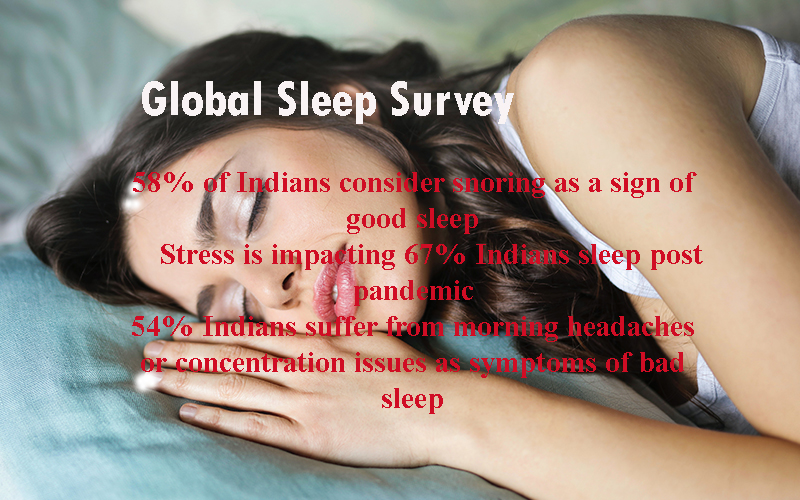– 58% of Indians consider snoring as a sign of good sleep: Global Sleep Survey
– Stress is impacting 67% Indians sleep post pandemic
– 54% Indians suffer from morning headaches or concentration issues as symptoms of bad sleep
ResMed, a global leader in digital health, sleep, and respiratory care, today released findings from its annual sleep survey, which looked at attitudes, perceptions, and behaviors around sleep health, as well as its impact on overall well-being. Conducted across Australia, Brazil, China, India, Japan, Korea, Singapore, Mexico, United States of America, United Kingdom, France and Germany, the ResMed commissioned survey found that the majority of 20,050 respondents surveyed recognize the importance of achieving quality sleep and its impact on overall health but understanding of the various solutions to address sleep-related issues remain elusive.


Out of 5018 Indian respondents, the survey found that 85% of respondents reported satisfaction with their sleep quality. Conversely, participants stated that electronic devices (40%), change of routine (37%), stress (37%), and financial pressures (37%) have caused the decline in their sleep quality, leading to adverse effects such as mood changes, excessive daytime sleepiness, and difficulty in concentration during the day. More alarmingly, 58% of Indian respondents surveyed consider snoring a sign of good sleep highlighting that they were unaware that snoring was a potential trigger of Obstructive Sleep Apnea (OSA) and other sleep-related issues. Contrary to popular assumption, snoring does not indicate a restful night’s sleep.
Highlights
- As people in India consider getting a good amount of sleep each night is important to improve overall immune system, 47% use a sleep tracker to record sleep habits and patterns as part of improving their sleep health, with 54% Millennials, 44% GenZ and 40% GenX using sleep trackers.
- 97% Indians have encountered a barrier while seeking treatment for sleep issues.
- Respondents from China (34%) and India (30%) are the most likely to say that they doubt treatment will improve their overall health and it is the barrier for seeking treatment for sleep related issue(s).
- As per respondents, only 21% males and 24% females have been tested for sleep apnea, highlighting the lack of awareness of sleep related conditions.
- Data from respondents revealed the quality of sleep in 2023 has declined by 22% compared to the previous year, due to work related factors such as work situation (e.g., commuting, working more, etc.), financial pressures, change in routines, as well as stress.
Despite 89% Indian respondents believing that getting a good amount of sleep each night is important for improving the overall immune system, many are still hesitant to seek treatment for sleep apnea or other sleep conditions due to high levels of uncertainty and doubts, particularly over concerns about the cost of treatment (32%) and fearful of potential results (30%). In fact, the survey found that only a handful would choose to consult a medical provider (20%) with the vast majority deferring to family or friends (57%) and online information (37%), for advice. While 67% respondents stated that doctors in the India ask about the quality of their sleep, close to a third (30%) individuals surveyed continuing to doubt the effectiveness of treatments in improving their overall health highlighting the urgent need to educate them about the health effects on overall sleep health, and proactive measures available to address them.
Seema Arora, Head – Marketing & Brand, South Asia, ResMed: We are encouraged to see that 84% individuals consider quantity of sleep as extremely important, but it is still concerning that many are experiencing a range of sleep-related issues that could indicate an underlying sleep disorder. It is important for people in India to recognize that sleep health is not solely defined by the amount of sleep we get, but rather by the collective factors that also impact the quality of our sleep. The survey results emphasize an urgent need for greater education on overall sleep health.
Globally, it is estimated that over 936 million people suffer from sleep apnea, with 28 million people in India alone. Certain risk factors such as excess weight, high blood pressure, smoking, older age and diabetes can also alert for OSA.
Survey Methodology
ResMed 2023 Global Sleep Survey included 20,069 total participants across the United States, the United Kingdom, Germany, France, South Korea, Mexico, Japan, Singapore, Australia, Brazil, China, and India, conducted in January 2023. For generational comparisons, the survey defines Gen Z as ages 18-26, Millennials ages 27-42, Gen X ages 43-58, Baby Boomers ages 59-77, and the Silent Generation ages 78-95.











